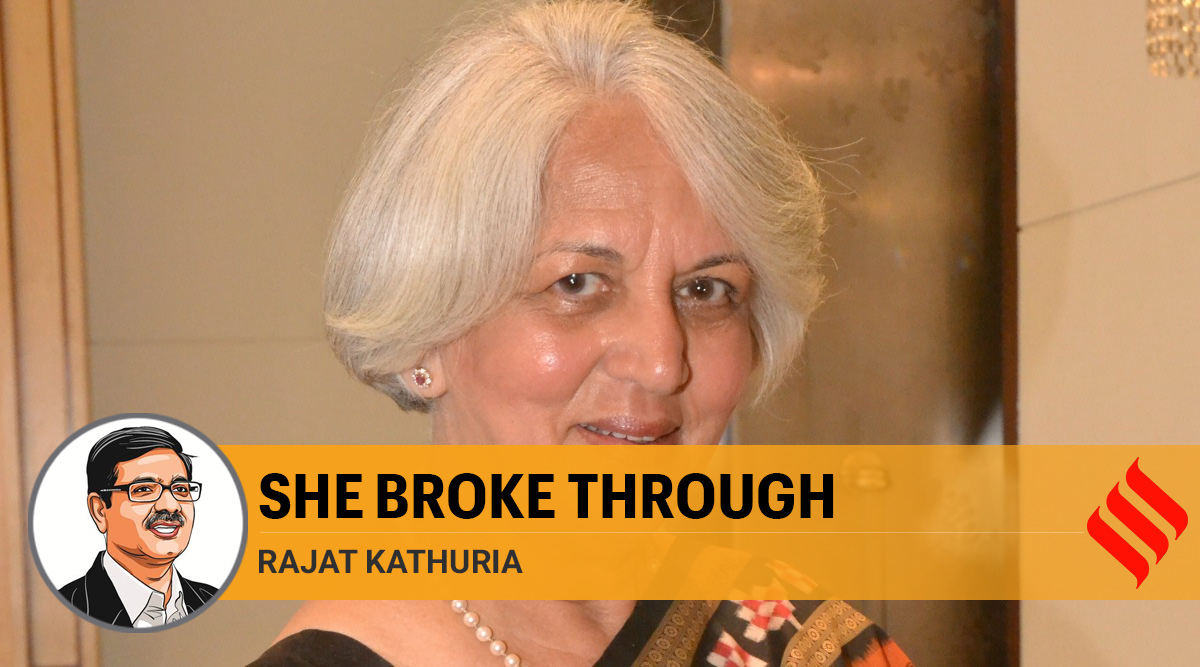 Isher last public appearance on ICRIER's platform was in February this year at the launch of Montek Singh Ahluwalia’s memoir, Backstage.
Isher last public appearance on ICRIER's platform was in February this year at the launch of Montek Singh Ahluwalia’s memoir, Backstage.When the phone rang to inform me of the passing away of Isher Judge Ahluwalia, former chairperson of ICRIER and my former boss, the world stopped, if only for an instant, as if someone had pressed a pause button. The poignancy of the moment was accompanied by a flashback of memories of a smiling Isher with perfectly groomed salt and pepper hair, announcing with grace, dignity, poise, charm and brilliance, the start of another conference at ICRIER. Her public persona was larger than life. Behind the exterior, there was also an Isher who was compassionate, supportive, loyal and who possessed almost a childlike desire to learn about issues that drew her interest.
My close association with Isher began fittingly with a conference in April 2012. I was to take over as director and chief executive of ICRIER later that year. She decided to “induct” me at an ICRIER event in Vigyan Bhavan where the then Prime Minister Manmohan Singh was the chief guest. An updated edition of the festschrift, India’s Economic Reforms and Development: Essays for Manmohan Singh, co-edited by Isher was to be presented to him. She told me Dr Singh (she always called him that) had agreed to come to only listen but secretly hoped he would say a few words. She felt strongly that India’s growth model needed new direction and that Singh could provide leadership as he had in 1991.
Over the years, I have shared platforms with stalwarts from government, academia and the private sector. When I questioned whether I belonged there, Isher insisted I did, and went on to supply the motivation and inspiration. What was abundantly clear to me was that ICRIER’s vast reputation and standing was inextricably linked with Isher. On occasions, ICRIER was (embarrassingly for her) referred to as her institute. Her name opened doors and funding opportunities, and after having worked closely with her, I can say with complete conviction that ICRIER was in her DNA. She was constantly thinking about ways to enhance the quality of research, attract new talent and raise more funds and was successful in all three.
For a scholar of her stature and with all the exceptional achievements to boot, she could well have rested on her laurels. There was nothing left to prove. But that was not Isher. Thank God for that. Not only did she inspire but was herself inspired by issues of urbanisation and governance. That, she often proudly declared, was her second calling as an economist. She made the area her own and would delight in speaking on urban issues, an area in which, in less than a decade, she acquired complete command. We often spoke about these issues in her office and home. In one such interaction she told me with almost childlike pleasure she had attended a talk by the visiting Deputy Prime Minister of Singapore, Tharman Shanmughanathan and asked him the definition of a smart city. His response was the use of technology to provide efficient and affordable pubic services to citizens. Can Indian cities be smart without the basics of water, solid waste management, sanitation and public transport she asked rhetorically.
Her remarkable memoir, Breaking Through, was heroically completed during the time she was suffering from acute ill health and despite that she produced the most touching, readable and stirring memoir of an extraordinary life. She dedicated the book to her two daughters-in-law, reinforcing what she had done through her professional life — support women and women economists. She once told me that allowing women to work flexibly from home (much before COVID struck) would double their productivity for they will need to prove themselves through their work rather than visibility in the office. Often in public platforms Isher would proudly declare that ICRIER owes much of its success to its favourable gender balance. ICRIER has had around 70 per cent women for much of its recent history.
Her last public appearance on ICRIER’s platform was in February this year at the launch of Montek Singh Ahluwalia’s memoir, Backstage. She worked tirelessly “backstage” to help him complete it, proof read drafts, check data sources and at the launch she basked in the adulation that he received. She broke down several times that evening, knowing what was in store, but was happy at another result. Singh who was the chief guest, spoke expansively and spontaneously on what was wrong with India’s growth model. Her secret wish had been granted. She remained loyal to him throughout. It was destined perhaps that she breathed her last on Singh’s 88th birthday. Some things are best accepted as god’s will. At ICRIER, we will continue to celebrate her life. Iqbal’s couplet sums her life rather well: “Khudi ko kar buland itna ki har taqdeer se pahle/khuda bande se khud puchhe bata teri raza kya hai.”
This article first appeared in the print edition on September 29, 2020 under the title ‘She Broke Through’. The writer is director & chief executive, ICRIER. Views are personal
📣 The Indian Express is now on Telegram. Click here to join our channel (@indianexpress) and stay updated with the latest headlines
For all the latest Opinion News, download Indian Express App.